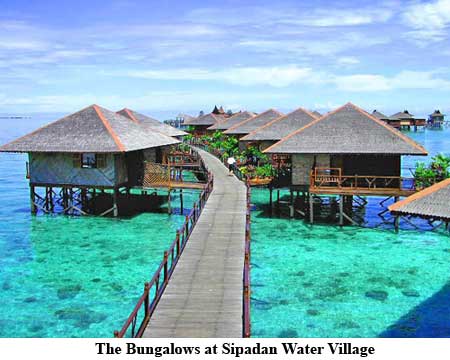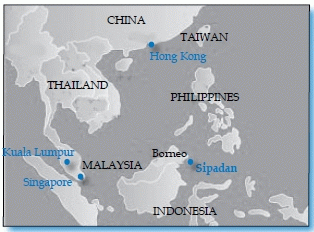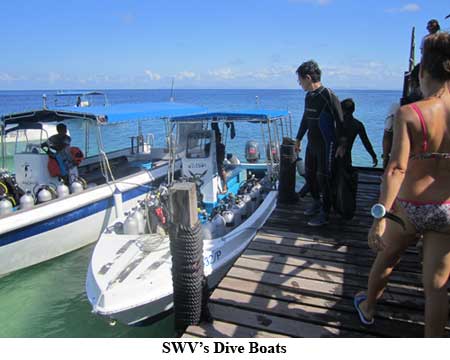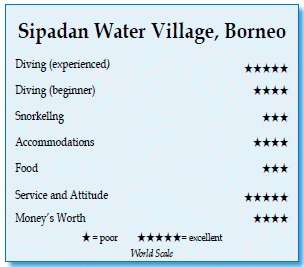Sipadan Water Village, Borneo, MalaysiaContents of this Issue: Sipadan Water Village, Borneo, Malaysia Bandito Charters, Tacoma, Washington How About Recycling Your Old Dive Gear? Bonaire, Cozumel, St. Vincent… Death in Belize from Exploding Tanks What Dive Shops Think About Your Gear The Dangerous Risk of Boats Without Dive Ladders Mastering Rebreathers, 2nd Edition What’s the “One DEMA” Product This Year? Maiden Dive Boat Trips: Another Liveaboard Owner’s Point of View Editorial Office: Ben Davison Publisher and Editor Undercurrent 3020 Bridgeway, Suite 102 Sausalito, CA 94965 orangutans in the jungle, orangutan crabs underwater from the January, 2013 issue of Undercurrent
Dear Fellow Diver: There's nothing like surfacing from a world-class dive and sharing the moment with a bunch of exuberant Italians. Although I couldn't decipher their lingo, I could definitely appreciate what they were jabbering about at the end of a 50-minute drift dive at Barracuda Point on Sipadan, where we'd seen almost every endemic species except barracudas.
SWV had been recommended by my travel agency, Reef & Rainforest, because it has the best record of scoring these limited permits. That opinion was borne out by Vickie Coker, owner of Travel Masters in Austin, TX, who told me, "The resort does the best job of coordinating permits and getting people to dive where they want to. They do not do a lottery system. They actually look at the demand and make the best decisions they can make, considering all the options." In fact, I got to Sipadan three out of four days of diving. Some others did even better. But I found that Mabul and nearby Kapalani have their own underwater attractions. SWV is exquisitely designed, with chalets on piers stretching over a shallow, crystal-clear cove. After a week in the steamy rainforests, I was delighted to wash the sweat and DEET out of my clothes and enjoy my deck overlooking the Celebes Sea. SWV is bug-free, unlike the malaria zones I had just visited. (I heard they spray for insects, but I never noticed any evidence.) August temperatures were in the 90s, but it was a luxury to open my doors and windows at night to admit the cooler sea breezes. The piers radiate from a central complex that houses a bar, lobby and reception area. Nearby is the open-air dining terrace and a small "mini-mart" for trinkets and a few essentials.
The next day's diving assignments were to be posted at 5 p.m. on large whiteboards. Six boats were scheduled for three-tank day dives, and all but one were going to Sipadan, including ours. No boat was carrying more than nine divers. SWV offers unlimited self-guided shore diving, including night dives, on the house reef. A guided night dive runs about $50 for one to three divers. Diving at SWV is a pretty relaxed affair. I'd stroll over to the dive center about 7 a.m., help myself to a complimentary snack and board my assigned boat to find my BCD and regulator properly set up on an aluminum 80 tank, then we'd cast off for a smooth 30-minute ride to Sipadan. Upon arrival, we checked in with the authorities, then headed for our first dive about 8:30 a.m. Everything was pre-planned, so we were never in the water with divers from another boat. On site, the divemaster and boatman helped me gear up, and the buddy pairs backrolled off the side in buddy pairs to wait on the surface until the group was together. Most dives were leisurely wall drifts. We were to stay above the guide, unless we saw something deeper to check out (a leopard shark once lured me down to 108 feet). Typically, my profiles were 60 to 75 feet for about 50 minutes. The guide would eventually lead us all up the wall, where we could enjoy colorful safety stops, then surface to meet our boat, which had been trailing our bubbles. At the swim ladder, I held up each foot and the crew removed my fins, then I handed up my weight belt and slipped out of my tank, which they retrieved. Then we'd head back to the Sipadan jetty for a surface interval. Snacks were served under a pavilion on the grounds of the old Pulau Sipadan Resort, site of the Abu Sayyaf raid. After the second dive, a hot lunch was served, and I appreciated the bathroom and shower facilities in the compound. While SWV is undeniably beautiful, the complex suffers from some Third World infrastructure problems. My bathroom plumbing leaked at first, and I never had hot water in my sink. Tap water was unpotable, so they supplied carafes of cool drinking water, which had to be replenished at the bar. My chalet also sported an array of non-working electrical switches. For most of my stay, my dive buddy and I were the only Yanks in the place, and while the European and Asian guests were cordial, people tended to stick together and converse in their native tongues. Despite the bar being the chief Wi-Fi hotspot, it was virtually empty every night -- and sparsely stocked. There was no wine by the glass, and the cheapest bottle, an Australian shiraz, was around $40. Fortunately, the local Tiger beer was an acceptable substitute. It would have had been more enjoyable if I had traveled with a group of friends, and we had brought our own refreshments to enjoy in our spacious, airy chalets.
But the diving made up for these minor disappointments. At Turtle Cave, we made a penetration deep into the light zone, but to go farther and see the skeletons of turtles that had drowned inside, one has to be cave-certified and led by a cave diving instructor. On our second dive at Hanging Garden, shifty currents caused us to change the direction of our drift three times. Nevertheless, I was enchanted by the soft corals waving above us. The second time we dove Barracuda Point, we started out kicking upcurrent for 30 minutes, but were rewarded when a wall of 'cudas swept by, then performed a graceful circle dance for us. A school of trevallys accompanied us for a while, then handed us off to a batfish patrol. I also saw a grouper bigger than an NFL lineman resting on the bottom, and Sipadan's signature fish, a five-foot humphead wrasse. There were so many grey- and white-tip reef sharks, we got tired of pointing them out to each other. Ironically, I had my most dramatic sighting not at depth, but just below the deck of my chalet. Over morning coffee, I watched a 12-inch jellyfish being attacked by a longhorned cowfish. They disappeared under the pier, with the cowfish still pecking away at the defenseless jelly. SWV is all about the diving, with little else to do. The village on shore seemed impoverished, and I was advised to watch out for overzealous begging kids. I did visit the nearby Mabul Water Bungalows resort one afternoon. It was as beautiful as SWV, but just as dead. I've seen more colorful hard and soft corals in Fiji and the Philippines, but what struck me at Sipadan was the profusion of life, from feather stars to fish. Although I didn't do any shore dives, I snorkeled over Paradise Two, another part of the house reef, which apparently has the best shore diving. The reef sloped further down than I could see in 45-foot visibility. A nice variety of coral outcroppings and soft corals punctuated the sandy slope. Banded sergeants and small black and white anemonefish flitted amongst staghorn and antler corals. A humphead bannerfish showed off his Jack Palance profile. The reef leads past the boat docks for two other resorts, Scuba Junkie and Borneo Divers, so I had to maneuver around the comings and goings of small craft. The one day when I didn't get to Sipadan started with a muck dive off nearby Kapalani Island. It was raining when we descended on the "house reef," a bunch of man-made structures that sheltered exotic creatures like white leaffish and scorpionfish. Here, I saw my first lionfish of the trip, making me wonder if they hadn't all migrated to the Caribbean. Other highlights included a flamboyant cuttlefish hunting for prey, and an unattached blue- and white-striped remora desperately seeking a host. I moved back to Mabul for wall dives at both Young Lobster and Old Lobster, where the visibility exceeded 100 feet, making it a very acceptable substitute for the walls of Sipadan. Ramil spent 15 minutes finding a pygmy seahorse on a sea fan, and pointed out a rare clown frogfish and a primeval-lookingcrocodile fish lying on a ledge. Ramil was always willing to listen to divers' requests, so because it was my birthday, I asked to see an orangutan crab. Sure enough, he produced two. They were less than an inch across, but under his magnifying glass, I could make out their oversize, hairy forearms, just like their arboreal counterparts. What a fitting end to a safari that started with orangutan encounters in the rainforest. -- Larry Clinton
|

I want to get all the stories! Tell me how I can become an Undercurrent Online Member and get online access to all the articles of Undercurrent as well as thousands of first hand reports on dive operations world-wide
| Home | Online Members Area | My Account |
Login
|
Join
|
| Travel Index |
Dive Resort & Liveaboard Reviews
|
Featured Reports
|
Recent
Issues
|
Back Issues
|
|
Dive Gear
Index
|
Health/Safety Index
|
Environment & Misc.
Index
|
Seasonal Planner
|
Blogs
|
Free Articles
|
Book Picks
|
News
|
|
Special Offers
|
RSS
|
FAQ
|
About Us
|
Contact Us
|
Links
|
3020 Bridgeway, Ste 102, Sausalito, Ca 94965
All rights reserved.

 In 80-foot visibility, I had come across four mammoth
green turtles lounging at a cleaning station atop a coral
head, with others queued up like autos at a car wash.
Nearby, I had spotted a giant trevally that appeared to
have a distended jaw, until a cleaner wrasse swam out of
one gill slit. At the Aquarium, hundreds of fearless footlong
trevallys swam right up to my mask before gliding
away. Later, I was entertained by two trumpetfish making
beautiful music, with a couple of coronetfish sitting
in. Ramil, our guide, used a magnifying glass to inspect
a tiny chromodoris nudibranch, while six-foot-long whitetip
reef sharks circled below. Ramil used an Etch-a-Sketch
to identify critters in both English and Italian -- pretty
impressive. Like most of my dives at Sipadan, we had
ascended above 20 feet when the first diver reached 500
psi. There, in bright
sunlight, it almost
hurt my eyes to
gaze at neon-colored
anthias and other
brilliant reef fish
darting among the
hard and soft corals.
In 80-foot visibility, I had come across four mammoth
green turtles lounging at a cleaning station atop a coral
head, with others queued up like autos at a car wash.
Nearby, I had spotted a giant trevally that appeared to
have a distended jaw, until a cleaner wrasse swam out of
one gill slit. At the Aquarium, hundreds of fearless footlong
trevallys swam right up to my mask before gliding
away. Later, I was entertained by two trumpetfish making
beautiful music, with a couple of coronetfish sitting
in. Ramil, our guide, used a magnifying glass to inspect
a tiny chromodoris nudibranch, while six-foot-long whitetip
reef sharks circled below. Ramil used an Etch-a-Sketch
to identify critters in both English and Italian -- pretty
impressive. Like most of my dives at Sipadan, we had
ascended above 20 feet when the first diver reached 500
psi. There, in bright
sunlight, it almost
hurt my eyes to
gaze at neon-colored
anthias and other
brilliant reef fish
darting among the
hard and soft corals. I had come to
the tiny island of
Sipadan (pronounced
Sih-PAH-dahn), off
Borneo's northeast
coast, after a week of touring jungle lodges in search of
pygmy elephants, hornbills and orangutans.
It had been a grand adventure,
but for a diver, nothing to compare
with the reefs of Sipadan. This legendary
dive destination has a turbulent
past. On Easter Sunday in 2000,
Abu Sayyaf militants (affiliates of al
Qaeda from the southern Philippines)
invaded a dive resort there, taking
several guests and staff members
hostage. Most were released by
September, after mediation by Libyan
leader Muammar Gaddafi. The last
escaped in June 2003. In 2004, the
Malaysian government evicted all dive
operations from the island, to safeguard
Sipadan's pristine environment
above and below the water. So today, divers stay on nearby islands and travel
to Sipadan's reefs by boat. The main tourism island is Mabul, home to Sipadan
Water Village (SWV) and a number of other dive resorts. The government permits
only 120 divers a day to visit Sipadan, and some dive operators dispense the
permits to guests through lotteries.
I had come to
the tiny island of
Sipadan (pronounced
Sih-PAH-dahn), off
Borneo's northeast
coast, after a week of touring jungle lodges in search of
pygmy elephants, hornbills and orangutans.
It had been a grand adventure,
but for a diver, nothing to compare
with the reefs of Sipadan. This legendary
dive destination has a turbulent
past. On Easter Sunday in 2000,
Abu Sayyaf militants (affiliates of al
Qaeda from the southern Philippines)
invaded a dive resort there, taking
several guests and staff members
hostage. Most were released by
September, after mediation by Libyan
leader Muammar Gaddafi. The last
escaped in June 2003. In 2004, the
Malaysian government evicted all dive
operations from the island, to safeguard
Sipadan's pristine environment
above and below the water. So today, divers stay on nearby islands and travel
to Sipadan's reefs by boat. The main tourism island is Mabul, home to Sipadan
Water Village (SWV) and a number of other dive resorts. The government permits
only 120 divers a day to visit Sipadan, and some dive operators dispense the
permits to guests through lotteries. The dive center, at the end of one pier, is well organized, with lockers,
rinse tanks and outdoor showers. After lunch on our first day, my buddy and I
reported to the dive center for a complimentary checkout. Rather than schlep
dive gear all over Borneo, we had decided to
rent everything except our masks, snorkels
and booties, and we wanted to get accustomed
to their gear. Divemaster Wit fitted us
out with new-looking 2-mil shorty wetsuits,
Italian-made Scubapro T-Sport BCDs, plus MK2
regulators, each with an octopus and metric
pressure and depth gauges. He fitted us each
with 12 kilograms of weight, which turned
out to be way too much. He skipped a buoyancy
test on the surface, instead instructing
us to simply kneel on the sandy bottom
and remove and replace our masks and second
stages. Then he took us on a short exploration
of part of the Mabul house reef known, somewhat grandiosely, as Paradise One. This was a classic muck dive, with more
litter than critters on the otherwise featureless bottom. Wit used a pointer
to show us macro specimens like a white-tipped anemonefish with eggs, a pipefish
and a giant black frogfish. We also saw a sizable green turtle, a foot-long
cuttlefish and plenty of yellow-striped snappers. The rental gear worked fine,
except for a faulty buckle on one of my fins, which fortunately broke before
I got in the water. Later, a strap broke on the same fin, confirming my bias
against TUSAs despite their consistently high performance ratings.
The dive center, at the end of one pier, is well organized, with lockers,
rinse tanks and outdoor showers. After lunch on our first day, my buddy and I
reported to the dive center for a complimentary checkout. Rather than schlep
dive gear all over Borneo, we had decided to
rent everything except our masks, snorkels
and booties, and we wanted to get accustomed
to their gear. Divemaster Wit fitted us
out with new-looking 2-mil shorty wetsuits,
Italian-made Scubapro T-Sport BCDs, plus MK2
regulators, each with an octopus and metric
pressure and depth gauges. He fitted us each
with 12 kilograms of weight, which turned
out to be way too much. He skipped a buoyancy
test on the surface, instead instructing
us to simply kneel on the sandy bottom
and remove and replace our masks and second
stages. Then he took us on a short exploration
of part of the Mabul house reef known, somewhat grandiosely, as Paradise One. This was a classic muck dive, with more
litter than critters on the otherwise featureless bottom. Wit used a pointer
to show us macro specimens like a white-tipped anemonefish with eggs, a pipefish
and a giant black frogfish. We also saw a sizable green turtle, a foot-long
cuttlefish and plenty of yellow-striped snappers. The rental gear worked fine,
except for a faulty buckle on one of my fins, which fortunately broke before
I got in the water. Later, a strap broke on the same fin, confirming my bias
against TUSAs despite their consistently high performance ratings. Except for breakfast, the buffetstyle
meals were Asian cuisine, featuring
unidentifiable, bony bits of meat,
poultry or fish and stir-fried veggies.
Salad makings were primarily lettuce,
tomato and shredded cabbage, with a side
of cole slaw. Desserts were dry cakes
and/or fresh fruit. While the meals
were tasty and nourishing, they quickly
became routine and mediocre. However, there was a selection of a la carte fresh
fish, starting around $22 per pound. On my last night, I discovered they also
take special orders, as I watched a Chinese foursome enjoy a meal of lobster soup
and a whole stonefish, the most venomous fish in the sea.
Except for breakfast, the buffetstyle
meals were Asian cuisine, featuring
unidentifiable, bony bits of meat,
poultry or fish and stir-fried veggies.
Salad makings were primarily lettuce,
tomato and shredded cabbage, with a side
of cole slaw. Desserts were dry cakes
and/or fresh fruit. While the meals
were tasty and nourishing, they quickly
became routine and mediocre. However, there was a selection of a la carte fresh
fish, starting around $22 per pound. On my last night, I discovered they also
take special orders, as I watched a Chinese foursome enjoy a meal of lobster soup
and a whole stonefish, the most venomous fish in the sea. Divers Compass: There are no distinct seasons in Borneo, as temperatures
and humidity are both high year-round; the rainy season
for the northeastern part of Sabah, Sipadan's state, is from
November to March . . . I flew to Kota Kinabalu, Borneo's capital,
from Hong Kong (other gateways include Singapore and Kuala
Lumpur) and from there, Malaysia Airlines flies 737s across the
island to Sandakan, where a boat takes you to Mabul . . . My
package at Sipadan Water Village included six nights in a standard
room, all meals, three boat dives a day, transfers and hotel
taxes at $1,794 per person, double occupancy; a Sipadan entry fee, about $13 per
person per day, is not included . . . The nearest recompression chamber is at
Semporna, 40 minutes away from Mabul by boat; military helicopters do fly in and
out of the village near SWV . . . The dive boats don't have facilities for photographers,
so any equipment adjustments must be made on shore and during the
surface intervals between each dive . . . Website:
Divers Compass: There are no distinct seasons in Borneo, as temperatures
and humidity are both high year-round; the rainy season
for the northeastern part of Sabah, Sipadan's state, is from
November to March . . . I flew to Kota Kinabalu, Borneo's capital,
from Hong Kong (other gateways include Singapore and Kuala
Lumpur) and from there, Malaysia Airlines flies 737s across the
island to Sandakan, where a boat takes you to Mabul . . . My
package at Sipadan Water Village included six nights in a standard
room, all meals, three boat dives a day, transfers and hotel
taxes at $1,794 per person, double occupancy; a Sipadan entry fee, about $13 per
person per day, is not included . . . The nearest recompression chamber is at
Semporna, 40 minutes away from Mabul by boat; military helicopters do fly in and
out of the village near SWV . . . The dive boats don't have facilities for photographers,
so any equipment adjustments must be made on shore and during the
surface intervals between each dive . . . Website: 